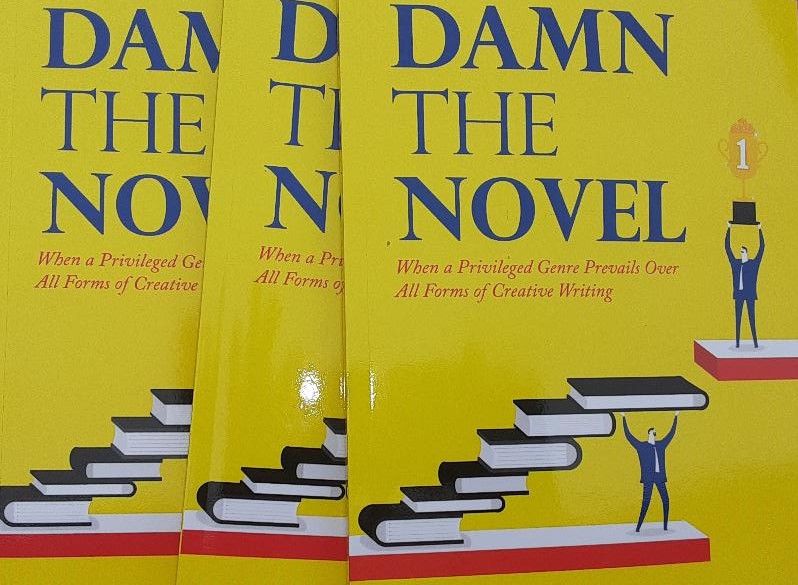Sudanese Canadian writer Amr Muneer Dahab’s brave move to denounce the ‘supremacy’ of the novel

BY PETER SESAY
Sudanese Canadian poet and essayist Amr Muneer Dahab recently stunned the publishing world with his new book in Arabic translated into English under the title: “Damn the Novel: When a Privileged Genre Prevails Over All Forms of Creative Writing.” In this volume of 160 pages comprising forty-five short stories published by AuthorHouse in Indiana, Dahab denounces the privilege granted to the novel, the literary genre that is treated by publishers—and viewed by the public—as superior to all others and is virtually guaranteed marketability and profitability, to the detriment of ot20hers. He writes: “[T]he value and the pleasure of any artistic or literary genre do come from their unique distinctiveness, not from taking all the light on the stage through pushing the other arts to the dark corners.”
A Quiet Rebellion
The initiative is provocative, by Dahab’s own admission. In an interview with Rupert Hawksley, a book reviewer, the author says: “Everybody is taking it personally, they are offended, but if they read the book carefully, it is a very objective view.” “Dahab is brave (but absolutely correct) to draw our attention to this worrying intersection of art and profit,” writes Rupert Hawksley, who thus supports the author’s statement that “It is simply against perpetuating the delusion that the novel is inevitably the most dominating and influential literary genre of the time.”
Though the book focuses on the Arabic literature, it takes a larger view on the matter. For the most part, the essays are standalone pieces that include the following:
- Anyone Can Write a Novel
- The Novel and Sex
- The Invention of Lying
- Novelists Believed Their Own Woven Lie(s)!
- Novelists are Cowards!
- Which One Is Hard to Write, Novel or Essay?
- No Market for the Short Story
- Writing and Lobbies
- Not Every Interesting Book Is Necessarily a Novel

The Writer’s Trajectory
Regardless of the artistic form, artistic talents are usually born in the artist at an early age. Amr Muneer Dahab is no exception. In an exclusive interview with Dahab, The African learned first-hand about the journey of an articulate writer who is now poised to shake things in the world of creative writing. He says his poetic talent emerged while he was in high school. He has since expanded his artistic field to shine as an essayist and literary critic, and has been graced with several awards in the process.
Born and raised in Khartoum, Sudan where he received his primary and secondary education, Dahab completed high school in Kuwait, and graduated as an electrical engineer from the Mansoura University in Egypt. After traveling virtually the world over, he eventually settled in the United Arab Emirates where he works as an electrical engineer. “My poetic talent emerged at high school, immediately after migrating to Kuwait with my family, as I was deeply missing my country and colleagues at an age where personal identity is typically formed,” Dahab tells The African. He says his poetic experience continued throughout the course of his education and was crowned with several awards at the level of the entire Egyptian universities.
Then came a migration from poetry to essay writing in the early nineties, thanks to his eldest brother Muhammad Muneer Dahab, then a writer and well-known journalist in Sudan (and also a civil engineer). The author recounts: “He insisted that I should adopt a writing career that is much closer to the readers at that time, asking me to write a weekly column for their newspaper along with my original passion: poetry.” But years later, says the author, “I broke up with poetry becoming a professional essayist.”
The African component in Sudanese culture
In addition to its universal appeal, Dahab’s work is also intrinsically the cry of a writer originally from the culturally-rich continent of Africa. In his interview with The African, the writer concedes that “Sudanese character, in general, is ethically and morally influenced by the Arab and Islamic values, which had been affecting Sudanese for centuries.” He however points to several features of Sudanese culture and society that he feels one should not overlook, including the fact that not all regions of Sudan speak Arabic as a mother tongue. Secondly, the African body and facial features for all Sudanese can never be ignored. Moreover, he stresses, these features, if observed calmly, would categorize Sudanese as African more than being Arab. Finally, says the writer, major parts of the Sudanese culture and spiritual beliefs are highly influenced by the African component at the expense of the Arab component (singing style, the pentatonic musical scale against the Arabic sevenfold musical scale, folktales, popular mythology, etc.)
Before the publication of his recent book, “Damn the Novel,” Dahab had penned more than twenty books, all written in Arabic. The following are the titles and description of a few of them in English.
No Compulsion in Revolution
In this book, Dahab criticizes the state of holiness attributed to the revolution uprisings in the Arab world in late 2010, and even to any revolutionary act in any place and time in general. As evidenced in numerous parts of the book, the writer does not advocate depriving people of their right to speak up against tyrannical regimes. But he feels such right should be exercised freely and spontaneously, not as a process of actions dictated by this or that rebel group.
O Writers Be Humble
The book deals with a range of controversial issues about writing and writers alike: Why did writers fail to make writing a profession that can guarantee them dignified (or even luxurious) life? Expecting the following answer: The reason lies in people’s desertion of books. Dahab inquires about professions that have attracted the attention and interest of people. Thus, the book investigates the literary, social and cultural arena directly related to writing, asking questions and anticipating what is going on in the recipient’s mind without imposing an answer on the readers.
Your Bedroom in Globalization
This book deals with the impact of globalization as seen by an observer who interacts with its new waves, disregarding the estimates and promises of globalization research centers all around the world, basically in the West and in the United States specifically. “Be Aware of USA,” “How Globalization is Made,” “Bedroom in the Emirates and Living room in Canada,” “Globalization and Sex,” “Why Should We Speak Clean English?”, “Globalization’s Frustration,” and “Globalization and Writers of the Masses” are some of the titles through which Dahab focuses on the influence of globalization on people (at home, on the streets, in the work places), on how they spend their weekends in shopping malls, and on other aspects of personal and social life, especially in the Arab world. The writer approaches the subject matter beyond the traditional studies about the impact of globalization on politics, economy and similar arenas.
Arab Genes
This book, as stated in its introduction, is not about the Arab character as a whole, but rather “that part of the character of Arabs dealt with behind the closed doors of secrecy/privacy. More precisely, the book is a deliberate reading of Arab national character and its national variants in accordance with its context.” It consists of many parts under titles such as “The Levantine and the Moroccan,” “What We Should Learn from Algeria and Egypt,” “The Hierarchy of Arab Creators,” “The Character of Iraqi People,” “How Others boast About Arabism,” “The Maghreb’s Got Talents,” “What Do We Lack to Become Masters.”
Other book titles:
Feelings and Ideas I Do Not Own (2018); Memories of Easygoing Students (2016); On the Margins of the Sudanese Character (2015); Some of My Improprieties (2015); Tales of a Poor Expatriate (2014); Wisdom Highway (2011); The Sudanese Character in the Eyes of the Sudanese Elite (2010), and Sudanese Genes (2010).


